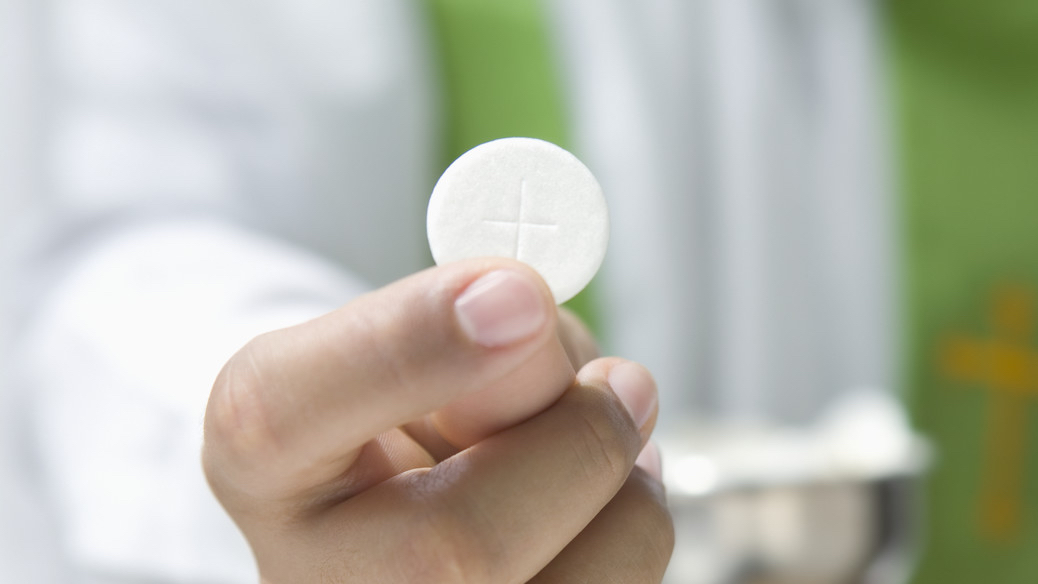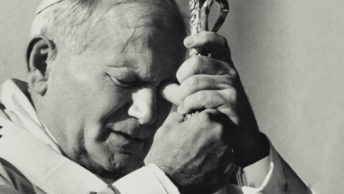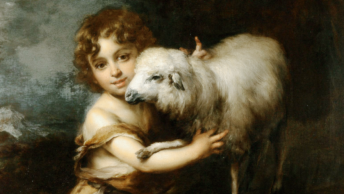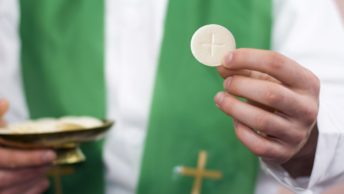We will do everything that the Lord has told us.[…] All that the Lord has said, we will heed and do.
Twice the old community of Israel solemnly promised God to obey His ordinances, decrees, statutes and commandments. And this solemn promise was sealed with blood. The blood of young bulls turned Israel of old into God’s community, God’s possession.
The blood of young bulls ratified the old covenant between God and His chosen people represented by the twelve pillars, one for each tribe. Thus for many centuries, every time the Passover meal was reenacted, the Israelites remembered that the Covenant with God made them very special, very dear to him, very precious to him. At the same time though, they were reminded of their obligation to live up to and keep their end of the deal, of the Covenant.
Fast Forward: What about the New Covenant? Jesus’ first 12 disciples, most likely, thought that what was about to happen in the Upper Room was a routine Passover celebration (Seder Meal). So, I wonder what went through their minds when Jesus told them to share and eat the unleavened Bread that had become his Body broken the following day on the cross; and what they felt in their hearts when he told them that the Cup from which they were ordered to drink was the Cup of his Blood meant to seal and ratify a New Covenant!
The significance, the newness, the obligation must have been nothing short of overwhelming. Historically it took them several decades to grasp them fully and completely. Yet the test presented was such that all believers throughout the history of the Church have always found it challenging to do the Eucharist in memory of Christ in the way intended by Jesus during the Last Supper and on Calvary. Thus, let me go over briefly this significance, this newness and this obligation to which we agree every time we partake of the Eucharist.
We are God’s new people of Israel. We are God’s new people, nourished not by simple manna as was Israel of old, but by the Flesh and Blood of Jesus. We are protected by the love of the Father and we are guided by his Spirit on a journey to the promised land of Heaven. By partaking of Jesus’ broken Body and poured Blood we become him, we become divine, thus we are indeed God’s children with his same Flesh and Blood. Yet we also assume a tremendous obligation: just as Jesus replaced the blood of sacrificed animals with his own Blood, so we, by partaking of his Flesh and Blood, commit ourselves to carrying out the New Commandmentjust as Jesus did on the cross.
“I give you a new command: Love one another. As I have loved you, so you must love one another.” (John 13:34)
In other words, every time we receive the Lord in Holy Communion we make a solemn promise in all similar to the one made by Israel of old:We will do everything that the Lord has told us. All that the Lord has said, we will heed and do.
There is, though, a substantial difference: Israel of old was promising faithfulness to God’s commandments based on the blood of young bulls; we make our promise based on THE Blood, Jesus’ and ours! And the promise entails our resolve to loving each other to the very end, all the way to sacrificing our physical life for others.
Even nowadays, quite a few of us here present are living out already this sacrificial aspect of the new commandment: their lives are being spent like Jesus’ for the sake of others due to a very serious illness, disability, or misfortune, or loss of income, and in many other heart-wrenching situations.
Thus, the Eucharist is the best source of comfort and courage made available to us and it is, for all believers, the most significant, most important deed in our entire earthly life. And because of this, it requires the right attitude and the right preparation from each one of us: out of respect for the mystery that we are called to live out and out of respect for what all others around us expect to receive from it.
As far as preparation is concerned, let us remember that we celebrate here the Wedding Feast of the Lamb (Jesus Christ) and his Bride (the Church). A wedding is therefore the benchmark against which we should plan our preparation for the Eucharist during the week. Interiorly, we have to be confident that we do not have any mortal sins on our souls. And, of course, our exterior demeanor is very important as well!
How much lower than how well we get ready for a nice wedding could we go before we show disregard for the Eucharist in the way we dress, in the way we kept or not kept from eating for at least an hour beforehand, as we prepare our entire self for this greatest of all events?
Speaking of fasting, I cannot imagine why someone would even think of chewing gum in church; but it happens and it is simply awful. None of those who chew gum in church would dare to do so when summoned to court for a traffic violation. Why would they do it here during the Wedding Feast par excellence?
As we enter, let us acknowledge the real presence of Christ not only in each other, but also in the tabernacle. We do so by genuflecting reverently or by bowing profoundly in the direction of the tabernacle.
Another thing: how could anyone wanting to share in this Wedding Feast be constantly, habitually late, Sunday after Sunday?
How could one justify talking inside the church while waiting for the Holy Mass to start?
And if we are expected to turn off our cell phones in a movie theater, why would we keep it on in church? Or, worse, why would we dare to busy ourselves playing with our smart phone while the rest of the Community of Faith is devoutly representing for itself the Sacrifice of the Cross?
Unfortunately, there are other ways in which we can show lack of faith in the real presence of Christ in the Eucharist, and also in the Community; it is done by not participating fully with the postures, the activities and the replies determined and indicated by the U S Catholic Bishops Conference (cf. Norms for Distribution and Reception of Holy Communion).
As we walk up to the front of the line, we should feel that we are a pilgrim Church nourished by the new Manna.
We are expected to respond “Amen” to the minister’s prompting with “The Body of Christ.” No other answer is acceptable, nor is silence acceptable.
Let all communicants bow reverently, then move up close to the minister distributing the Body of Christ and after answering “Amen,” let them open their mouth and stick out their tongue slightly or raise both hands (for right-handers, left hand on top of right hand) to receive the Body of Christ.
Do not come up with both palms open next to each other and let the minister guess where to place the Host.
No one is allowed to take the Sacred Host from the minister’s hand! For right-handers: pick up the Host with your right hand off your left hand and consume the Host immediately. Do not lap up the Host from your hand! This must suffice.
Please take all these reminders as a kind, yet earnest invitation to all of us to truly live up to the mystery we celebrate in here together and we shall all promise: “All that the Lord has said, we will heed and do.”








